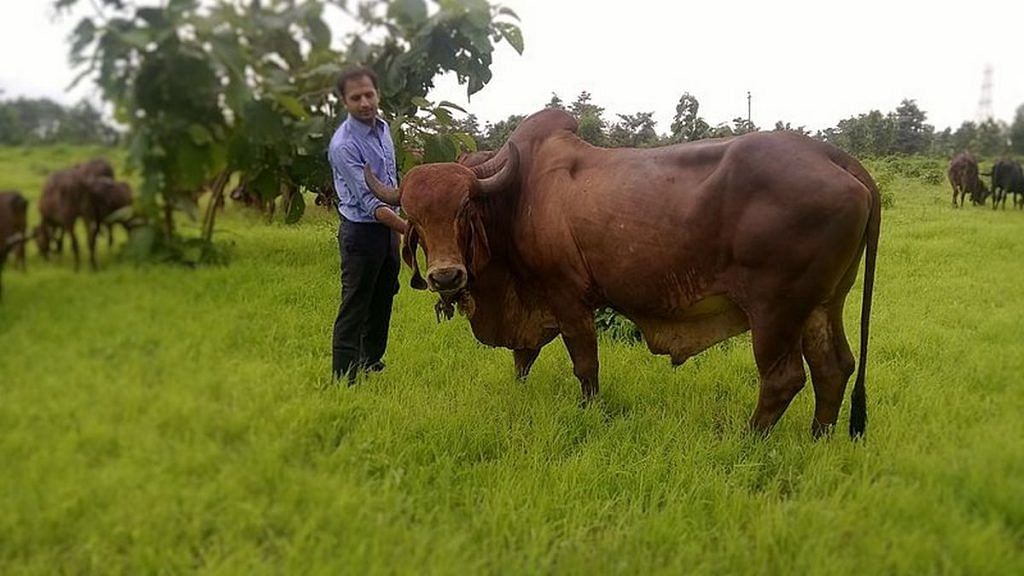New Delhi: In his annual Vijaya Dashami speech on 8 October, Rashtriya Swayamsevak Sangh (RSS) chief Mohan Bhagwat had questioned the government’s plans to import frozen Gir bull semen from Brazil to increase the yield of this indigenous breed.
Bhagwat said it was Brazil that had imported these bovines from India, an indigenous breed native to Gir and its surrounding regions in Gujarat, to improve the South American nation’s local varieties.
“Why bother…we have Gir cow…it’s good. It gives 28-30 litre of milk and is found across Gujarat. Now, what is the need to ask it from Brazil? Swadeshi (Gir) is here. They (Brazil) should come, we will give,” Bhagwat said in his address.
The RSS chief had made a factually correct point but overlooked a key aspect on why India wants to import frozen semen of ‘Girlonda’ — the name by which the breed is referred to in Brazil. According to the Food and Agriculture Organisation, the average milk yield of the Brazilian variety is over 120 per cent more than the Indian breed.
In the 1940s, 18 Gir cows were given to Brazil by the then Maharaja Krishna Kumarsinhji Bhavsinhji Gohil of Bhavnagar state in Gujarat. Gir went on to be referred as ‘Gyr’ in the South American nation and was subsequently crossbred with Holstein, a Dutch variety, to create the hybrid ‘Girolando’. This breed proliferated rapidly across Brazil and contributed to about 80 per cent of the nation’s milk production. It was registered officially in 1989 by Brazil’s agriculture ministry.
India had in 2018 signed an memorandum of understanding with Brazil for 1 lakh doses of frozen Gir bull semen for artificial insemination to increase the indigenous breed’s yield.
Also read: Mohan Bhagwat throws a challenge at Modi, revives ‘Swadeshinomics’ amid economic crisis
‘Low healthy Gir variety in India’
The average milk yield of the Gir in India is 1,590 kg per lactation, with a record production of 3,182 kg and a low fat content of 4.5 per cent. In comparison, the Brazilian breed average 3,500 kg per lactation, with a world record production of 17.120 kg by the cow Profana de Brasília.
Speaking to ThePrint over phone, Guru Prasad Singh, a dairy expert at the Institute of Agricultural Sciences of Banaras Hindu University, said India has abysmally low healthy Gir variety for cross-breeding experiments.
“Over a period of time, the indigenous breed has been affected by diseases in the reproductive organ. Also, the breed was no longer required because of increasing mechanisation in Indian agriculture that resulted in a decline of its population,” Singh said.
He also explained how Brazil, with a high meat consumption requirement, has increased the cattle weight from an average 600 kg to 900 kg by altering feeding, breeding and management methods.
‘Experts fear import of diseases’
Livestock experts have, however, cautioned against importing frozen semen of the Brazilian variety of Gir and cited the fear of diseases.
A genetic scientist at the Indian Veterinary Research Institute (IVRI) in Bareilly, who did not want to be named, told ThePrint there have been apprehensions about frozen Brazilian cow semen leading to newer diseases in India.
“The Holstein-Friesian cow breed, which were brought in India in the 1990’s from New Zealand brought diseases like the Infectious Bovine Rhinotracheitis (IBR) and Bovine Virus Diarrhoea (BVD) with them,” the scientist added.
The expert also said IBR and BVD are contagious diseases caused by a virus responsible for abortions and possible respiratory infections such as “pink eye type” and foot lesions in bovines.
“IBR and BVD came to India in the 1990s but was detected only in 2001, resulting in a drastic decline of healthy bulls for breeding. Similarly, a new disease can cause havoc to Indian cattle even before it is detected,” he added.
Also read: Lack of Vedic knowledge causing wars & destroying environment, says Mohan Bhagwat
